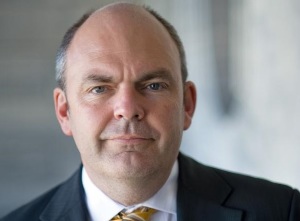Major changes for Reserve Bank?
Interest rate decisions could soon be made somewhat differently after both National and Labour suggest changes for the Reserve Bank are on the cards.
Monday, April 10th 2017, 12:01PM
by Miriam Bell

Finance Minister Steven Joyce
Finance Minister Steven Joyce has announced that Treasury has appointed former State Services Commissioner Iain Rennie to review two aspects of Reserve Bank governance.
First, the review will look into the Reserve Bank’s process for making OCR decisions.
Currently, the Reserve Bank follows a voluntary committee process when deciding whether to raise or cut the OCR but, under the legislation, the Reserve Bank Governor actually has sole power to make those calls.
This is unusual compared to most central banks and critics point out that it puts a lot of power in the hands of an unelected official.
It is understood the review will look at the merits of formalising a committee for OCR decisions, but it may also look into whether any such committee should feature someone external to the Reserve Bank itself.
Second, the review will consider whether the Reserve Bank should remain in charge of the various pieces of legislation that it operates under.
In New Zealand, most "non-core" government agencies don’t manage the legislation they operate under and there are concerns that the Reserve Bank’s scope to do so could have a less than optimal impact.
Banking commentator Michael Reddell said the review was very welcome news and he was encouraged that Joyce had initiated it.
“With the Governor confirming that he is leaving in September, and a year now until a permanent new Governor is in place, it is good time to have such a review, so as to be open to the possibility of reform, including in discussion with potential candidates for Governor.”
That said the review is a pretty small step, but it is likely to set in place momentum leading towards some legislative reform next year, he said.
“It is only an unambitious start, but the start matters.”
The broader political climate supports some change in this area, with many political parties in favour of it.
In particular, the Labour Party has announced that it has plans of its own when it comes to the Reserve Bank and the setting of monetary policy.
Labour’s finance spokesperson Grant Robertson yesterday told media that the Reserve Bank’s mandate was to control inflation but that was not enough any more.
He said the Reserve Bank has a role to play in the rest of the economy, particularly in terms of jobs, and, for that reason, it should consider the unemployment rate when making interest rate decisions.
This occurs in other countries, such as the US, and could result in the Reserve Bank making interest rate calls differently.
Robertson looked to 2014 when inflation was incredibly low, but unemployment was still quite high as an example.
“If they've got a different mandate now to think about both of those things, then they may well have lowered interest rates rather than increased them at that point.”
This morning Robertson announced that Labour would change the OCR setting process.
It would institute a voting committee made up of the Reserve Bank Governor, two Deputy Governors and Chief Economist, along with three external appointees.
Additionally, Treasury would have non-voting input.
| « Challenging times for credit unions | Vincent Capital adds a South Island BDM » |
Special Offers
Comments from our readers
No comments yet
Sign In to add your comment
| Printable version | Email to a friend |



